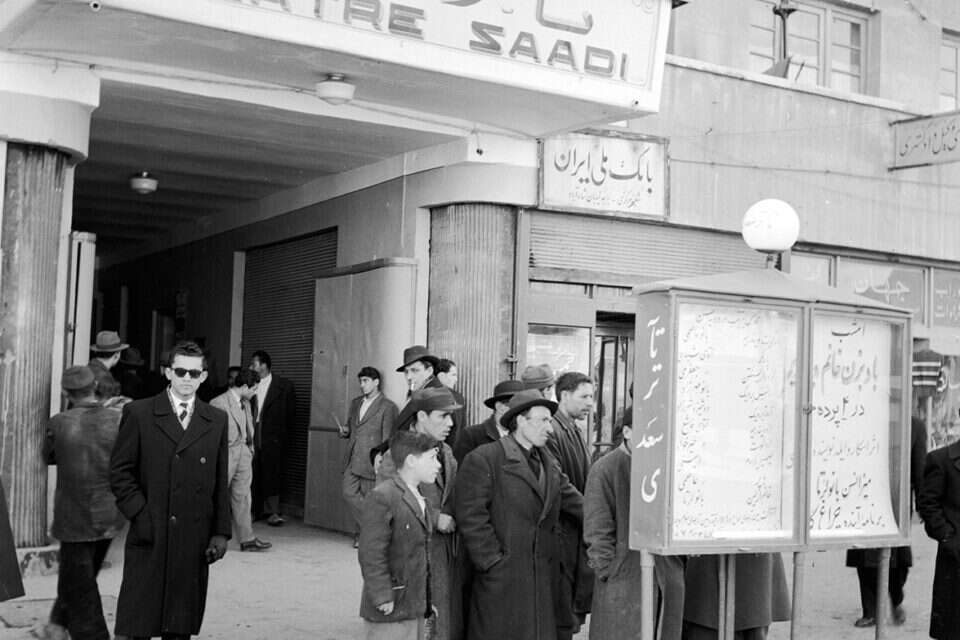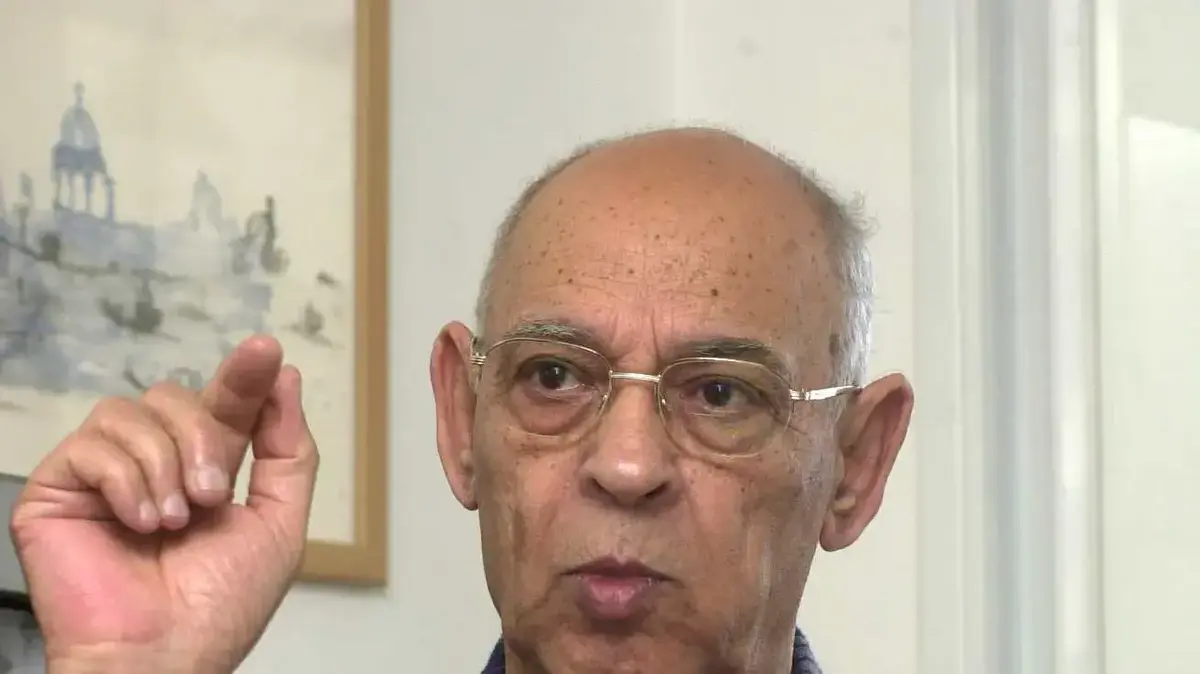A principal took up his position at an elementary school on the outskirts of Tehran.
He does not particularly want to be a school principal, but even less does he want to continue to be a teacher.
He sees the corruption around him, the outdated teaching methods, the violent corporal punishments imposed on students and the misery and helplessness of everyone around him - teachers, students, servers, parents.
Sees, and does nothing.
The novel "School Principal", written in 1958 by the Iranian writer and intellectual Jalal al-Ye Ahmad (1969-1923), gained immense popularity with its publication. It was read as a scathing critique of the Iranian education system of the time, and moreover - as a critique of the corruption and helplessness that pervaded the Shah's rule, and was adopted both by the educated members of Western culture and by the religious seminary students in the holy Shiite city of Qom.
"The book is one of the real-time expressions of criticism against the monarchy under which it was written," says the book's translator Orly Noy, when it was published in Hebrew in the "Makhtub" series published by the Van Leer and Pardes Institute. "But at the same time it has a universal element, in that it describes how the cynicism of the use of force seeps down, giving rise to neglect, injustice and lack of resources - layers of helplessness and carelessness that pile on top of each other. Then, even when someone with good intentions arrives, "The school principal, in the end he raises his hands and leaves. I think these things are not foreign to the Israeli experience either."
The ideas of Ali Ahmad in this novel and in his other writings fueled the 1979 revolution. Do you think the book can allow Israeli readers to identify with the social sentiment that brought about the revolution?
"I think there is a deliberate attempt to keep Iran in the minds of Israelis as a monster that everything that comes out of it is evil and terrible. And it's a shame, because knowing the other's culture says nothing about being able to resist it. I strongly oppose Iranian rule Iranian culture, to boycott it, is a barbaric act, to ignore the complex social background of the revolution, to say that the Iranian people are all Khamenei and Raisi - it is to inflict ignorance on ourselves, and ignorance should not become an ideology.
"Some of my considerations in choosing a book to be translated, beyond its literary level, include the book's potential to help the Israeli reader become acquainted with Iranian culture. I see this as a political project, cultural activism," says Noy, who is also a translator. .
"In Israel, they know that Iranians make huge films and write the best poetry, but they still do not know the treasure of Iranian prose."
Jalal al-Yi Ahmad,
Struggling with modernity
"The Principal" is indeed his most popular prose book, but al-Yi Ahmad became even better known for two influential essays he published a few years later: one, "Arbazadgi" (which can be translated as "Western Poison" or "Western Madness"), published in 1962, was a scathing indictment of the Iranian Shah's policy of modernization and intervention.
The second, "The Journey to the State of Israel" was published in 1964, was written following the visit of Eli Ahmad to Israel, at the invitation of the Ministry of Foreign Affairs. At that time, before the Six Day War, he saw Israel as a political ally, and covered with great sympathy what he saw during his visit: the establishment of Israel was in his eyes a just solution after the extermination of Jews in the Holocaust, and the kibbutz system, on its socialist values, aroused his curiosity and identification. It was only after the Six Day War that these pro-Israel positions were reversed.
In the end, Prof. Hagai Ram from the Department of Middle Eastern Studies at Tel Aviv University added that he writes about the crucial role of the "Arbazadgi" essay in training the hearts of the masses in Iran in the run-up to the revolution. The term "Gharbazdi" has even become part of the rhetoric of the leader of the revolution, Ayatollah Ruhollah Khomeini. Al-Ya Ahmad wrote in this essay about Westernization as a type of illness or mental disorder that infected the Iranian body and blackmailed its authentic identity. He likened Western influence to a raid of sturgeon beetles on wheat, attacking the plant from within, while the mantle remains intact.
"According to Ali Ahmad, Iran's accelerated industrialization, led by experts from the West and especially from America - what he calls the 'machine', as an inclusive name for the capitalist structures that replaced traditional society - enslaved Iran to Western technology and destroyed its traditional structure. The process of mechanization can be reversed, he writes, the "machine" rudder must be taken from the foreign hands that have taken over it.
El-Yi Ahmad's criticism of the Western "machine" marked El-Ye-Ahmed's own turn to Islamic discourse, even though he himself did not lead a religious lifestyle.
He was born into a family of Shiite theologians and received a traditional education, but in adulthood moved away from religion.
His renewed rapprochement with the religion came after he abandoned the Iranian Communist Party, amid a belief that only Shiite Islam could mobilize the masses for revolutionary change in Iran.
"Criticism such as that of Ali Ahmad uses the tools of the West itself against the West: he uses Marxism, among other things, precisely to find the national, unconquered self," says Dr. Uri Goldberg, a Shiite and Iranian researcher at Reichman University (Center IDC Herzliya). "He wanted to find an authenticity that could not be translated only in terms of status, as in Marxism.
Therefore his attitude towards the West is driven by a very great ambivalence.
"The hero's disgust with reality is also expressed in language."
Orly Noy // Photo: Oren Ben Hakon,
"If the Shah at the time is the one who wants to differentiate Iran from Islam, then al-Yi Ahmad understands that whoever can not formulate a narrative of change that also includes Islam - will not be able to formulate a narrative of change. He was not religious, but he thought a real political change Must include religion.In this he is very advanced because there were many who supported change and were unwilling to talk about the religious issue - and he claims to them that it is part of their Western alienation.I think similar questions arise in Israel as well: Could there be a change in the spirit of the universal left? "That there should be a dialogue beforehand on the question of what is a Jew? After all, most of the Zionist left does not want to talk about its Judaism."
The "school principal" is still very Marxist. Where do you find this turning point in religion?
"It is a text that represents the existential embarrassment of Ali Ahmad, after both communism and nationalism failed. He wrote The School Principal a few years after Musadek's national movement was suppressed and dispersed in the 1953 coup, and at that time he felt the movement towards the future was not. He does not necessarily oppose modernity, but he feels that he is missing something, and at this point he does not yet know what is missing. ". In response to this embarrassment he seeks authenticity."
The novella "School Principal" describes the education system in Iran in the form of the "machine" described by Al-Ahmad in his essay on the ills of the West: an alienated "machine" that has so many defects that the new principal, who has just taken office, has no choice But to completely surrender to her.
"Again and again I end up saying to resign, again and again I am too lax to do so," he says.
Heroes without names
The Marxist notion that the defect is systemic and therefore impossible to overcome through the action of a single virtuous person is also expressed in the story in the absence of names: none of the characters in the book appear in its name, and all are presented only through their role - "fourth grade teacher". "The server", "the account teacher", also the administrator himself. He sees the injustices, but fails to deviate from his role within the machine. Even when he sees his deputy beating students with twigs cruelly, and shocked, he finds no way to intervene. In the school described by al-Yi Ahmad, none of the characters manages to fix the "machine"; The only way is to escape from it - or destroy it altogether.
"Al-Yi Ahmad built the character of the director as an anti-hero," says Noy.
"He's by no means a hero. The system has completely eroded him. He demonstrates how a corrupt system turns teachers into corrupt ones. He knows that the fate of students depends largely on him. But he finds that when you are screwed so deep into the system, even if you try to change even a little Your threading route is no longer in your hands. "
Noy, who immigrated from Iran with her family at the age of 9, immediately after the outbreak of the revolution, experienced these teaching methods herself.
"Although I studied in a Jewish school that was very different from the school described in the novel in terms of socio-economic level and the quality of the teachers. But memorization, spelling and innocent writing were still key tools in the school. "The experience was one of suffering and oppression."
Dr. Uri Goldberg,
There were no more corporal punishments?
"With a ruler on hand there were still. The system was hierarchical and rigid. I think if it was the situation in a good and advanced school like the one I studied in, in the periphery it would be much closer to the descriptions of Eli Ahmad. If the Israeli reader wants to understand today's Iran "It is important that he understands that the revolution came against the background of real hardship, that it was first and foremost a social, not religious, revolution. Communist currents were partners in this revolution, and only then did the victors eliminate all other currents."
From "School Principal": "In the past I read a lot of nonsense about the factors that affect children's learning ability: teachers, the quality of the board erasure, the cleanliness of the toilet or a thousand and one other things, but here the power of education is measured by one thing: the quality of shoes. Wet cloths were heavy on the feet, and if you hurried to step on them, they would sink in the mud and get out of the feet. Education was a kind of escape route. "
"The language that al-Ahmad uses is bureaucratic, restrained and accurate," says Noy.
"His protagonist is alienated from what he describes, and also from himself. He does not try to impress the reader with a world of rich images and virtuoso language, which in a sense are easier to translate because they leave you as a maneuvering translator and give your ego more room to juggle your translation skills. "His language into Hebrew was a slightly frustrating experience. The disgust he feels towards the reality he describes is also expressed in the language."
Subversive literature
Noy says she is updated on what is happening in contemporary Iranian prose through stores in the US and Europe that sell books to Iranian exiles. "There is an underground scene in literature, as in music and other fields.
A writer like Mahmoud Dolat-Abadi (Noy translated his book The Colonel's Sunset, Am Oved, 2012) publishes both literature that undergoes Iranian censorship and subversive literature.
His latest book deals with the Iran-Iraq war - one of the themes that Iranian literature has dealt with intensively in the last two decades.
"Iranian women's literature is also very interesting. One of my favorite writers is Zoya Pirzad, a very popular writer of Armenian descent, who describes women's experiences lightly and beautifully. Because Iran is not explicitly represented, Iranian writers are forced to find implicit ways to represent it, and a writer like Pierced Can describe episodes upon episodes of ongoing courtship, without saying anything explicitly. "
Do you still have a family in Iran?
"I have quite a few family, including first-degree cousins. We talk on WhatsApp once in a while. When they see riots with me, and when I see riots there, we call to make sure everything is fine. Today it's hard to set boundaries."
Were we wrong?
Fixed!
If you found an error in the article, we'll be happy for you to share it with us









